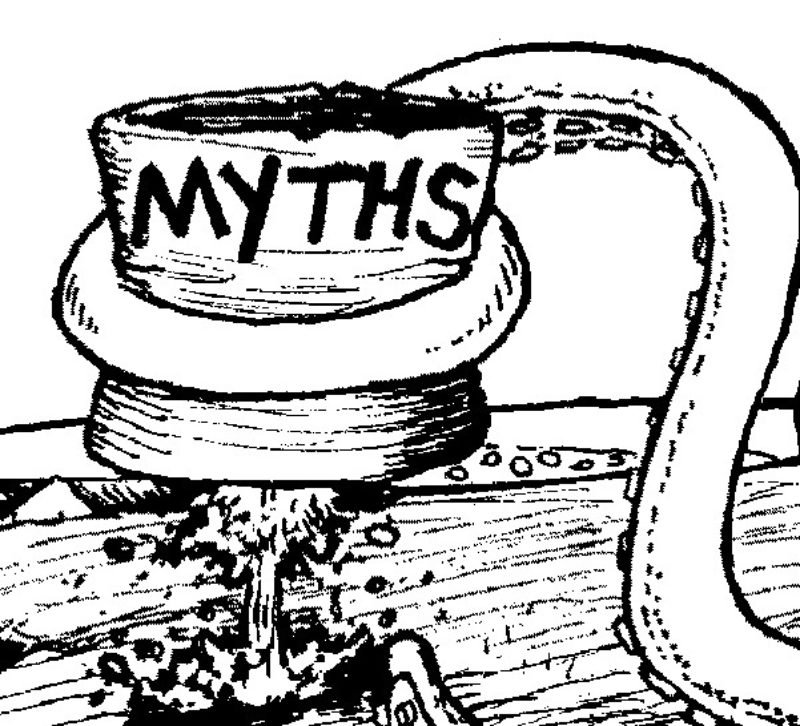The Land Stewardship Project has developed a series of deeply researched “Myth Busters” to address some of the misrepresentations circulated by supporters of corporate-controlled industrial agriculture:
• Myth #68: When Nitrogen is Gone, it Can be Forgotten
• Myth #67: Bird Flu’s Deadly Variant is the Fault of Regenerative Ag & Nature
• Myth #66: More Hogs on Fewer Farms = More Money in Local Piggy Banks
• Myth #65: ‘Climate-Smart’ NRCS Practices are all ‘Climate-Smart’
• Myth #64: Nitrogen Fertilizer & High Yields are Inextricably Linked
• Myth #63: Lawsuits Are Always About Winning
• Myth #62: Commodity Ag is Rural America’s Cash Cow
• Myth #61: Carbon Trading is Ag’s Climate Change Silver Bullet
• Myth #60: CAFO Digesters are a Good Public Investment
• Myth #59: Deep Soils Are Always Healthy Soils 
• Myth #58: Fake Meat Will Save the Planet’s Climate
• Myth #57: Abusive Work Conditions are ‘Essential’ to Heading off a Meat Famine
• Myth #56: Mega-Dairies = Mega-Benefits for Rural Communities
• Myth #55: Every Acre is a Potential Nitrogen-Fueled Superstar
• Myth #54: ‘Farm the Best-Preserve the Rest’ Will Prevent Ecological Collapse
• Myth #53: Food Nutrition Programs Mostly Benefit Lazy Welfare Cheats
• Myth #52: Working Lands Conservation Programs Don’t Pay
• Myth #51: The Land Will Quickly Become Carbon Saturated
• Myth #50: Conservation Compliance is Saving Soil
• Myth #49: We Don’t Need Publicly Supported Research
• Myth #48: Commodity Checkoff Programs are Accountable
• Myth #47: Cattle are a Climate Change Catastrophe
• Myth #46: Neonics in Soybeans Make Economic Sense
• Myth #45: Less Wildlife Habitat Makes for Safer Food
• Myth #44: Tallgrass Prairies & Livestock Don’t Mix
• Myth #43: ‘New’ Farmland is From Already Tilled Acres
• Myth #42: Free Trade is a Windfall for U.S. Ag
• Myth #41: Corn residue is a waste product
• Myth #40: Cattle & water should never mix
• Myth #39: By 2050 we will need to nearly double crop production to feed 9 billion people.
• Myth #38: Genetic engineering can replace diversity.
• Myth #37: A new class of pesticides is harmless to the environment.
• Myth #36: Diverse crop rotations may be a boon to the land, but are a bust when it comes to farmers’ bank accounts.
• Myth #35: High land prices benefit the economies of rural communities.
• Myth #34: Townships don’t have the resources to control development.
• Myth #33: Artificial drainage of agricultural land is a boon to the environment.
• Myth #32: Using crops to produce biofuels does not raise food prices
• Myth #31: Soil erosion is at sustainable levels.
• Myth #30: Banning subtherapeutic use of antibiotics in livestock production will be an economic disaster for farmers.
• Myth #29: Producing clean water in rural areas will require taking the majority of our farmland out of production.
• Myth #28: Roundup is not a long-term environmental threat.
• Myth #27: Local and regional food systems don’t help the economy.
• Myth #26: Genetically modified crops have reduced pesticide use.
• Myth #23: Organic and sustainable farming systems are a luxury only well-fed countries like the U.S. can afford.
• Myth #22: Buying locally produced food will automatically reduce your ecological footprint.
• Myth #21: Sustainable farming methods cannot feed the world.
• Myth #18: Federal law makes it illegal to favor local farmers when purchasing food for public schools.
• Myth #16: Large-scale factory livestock farms succeed because of the efficiencies of the free market.
• Myth #15: Organic vegetable production spawns outbreaks of deadly bacteria.
• Myth #13: Industrial agriculture is efficient.
• Myth #12: Global climate change will benefit agriculture.
• Myth #11: Large-scale factory hog farming creates strong local economies.
• Myth #10: It will be prohibitively expensive to tell consumers what country their food comes from.
• Myth #9: All certified organic milk comes from cows that spend most of the year grazing on pastures.
• Myth #8: Insecticide sprays eliminate pest problems in farm fields.
• Myth #7: We no longer have a soil erosion problem in this country.
• Myth #6: Genetic engineering is the only viable method available for improving food crops.
• Myth #3: There are so few small- and medium-sized farms left that it is not worth saving them.
• Myth #2: Strict “Right to Farm” laws help alleviate land use conflicts in rural and suburban areas.
• Myth #1: Anti-corporate farm laws stifle rural economic development.